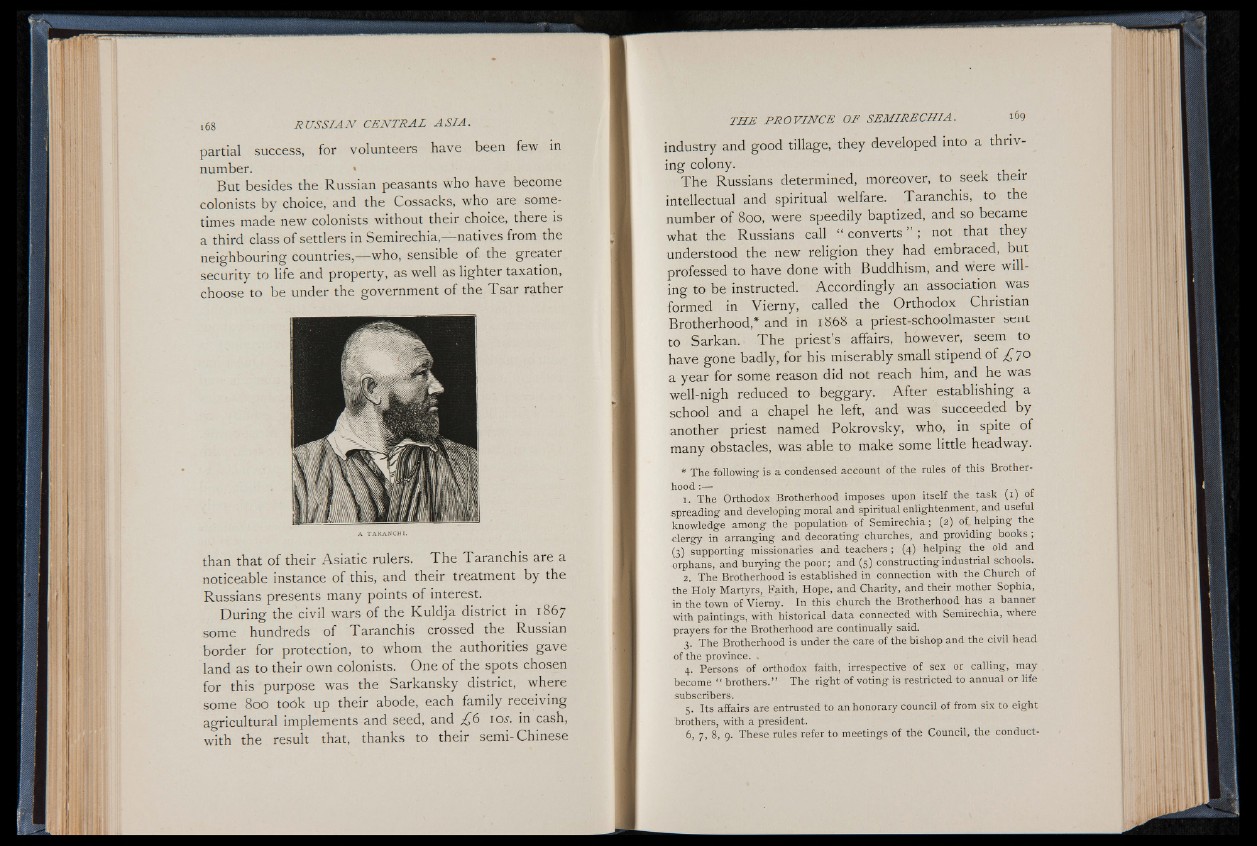
partial success, for volunteers have been few in
number.
But besides the Russian peasants who have become
colonists by choice, and the Cossacks, who are sometimes
made new colonists without their choice, there is
a third class of settlers in Semirechia,— natives from the
neighbouring countries,— who, sensible of the greater
security to life and property, as well as lighter taxation,
choose to be under the government of the Tsar rather
A TARANCHI.
than that of their Asiatic rulers. The Taranchis are a
noticeable instance of this, and their treatment by the
Russians presents many points of interest.
During the civil wars of the Kuldja district in 1867
some hundreds of Taranchis crossed the Russian
border for protection, to whom the authorities gave
land as to their own colonists. One of the spots chosen
for this purpose was the Sarkansky district, where
some 800 took up their abode, each family receiving
agricultural implements and seed, and £ 6 ioi. in cash,
with the result that, thanks to their semi-Chinese
industry and good tillage, they developed into a thriving
colony.
The Russians determined, moreover, to seek their
intellectual and spiritual welfare. Taranchis, to the
number of 800, were speedily baptized, and so became
what the Russians call “ converts ” ; not that they
understood the new religion they had embraced, but
professed to have done with Buddhism, and were willing
to be instructed. Accordingly an association was
formed in Vierny, called the Orthodox Christian
Brotherhood,* and in 1868 a priest-schoolmaster sent
to Sarkan. The priest’s affairs, however, seem to
have gone badly,, for his miserably small stipend of £ 70
a year for some reason did not reach him, and he was
well-nigh reduced to beggary. After establishing a
school and a chapel he left, and was succeeded by
another priest named Pokrovsky, who, in spite of
many obstacles, was able to make some little headway.
* The following is a condensed account of the rules of this Brotherhood
:— .
1. The Orthodox Brotherhood imposes upon itself the task ( i) ot
spreading and developing moral and spiritual enlightenment, and useful
knowledge among the population of Semirechia; (2) o f helping the
clergy in arranging and decorating churches, and providing books ,
(3) supporting missionaries and teachers ; (4) helping the old and
orphans, and burying the poor; and (5) constructing industrial schools.
2. The Brotherhood is established in connection with the Church of
the Holy Martyrs, Faith, Hope, and Charity, and their mother Sophia,
in the town of V ierny. In this church the Brotherhood has a banner
with paintings, with historical data connected with Semirechia, where
prayers for the Brotherhood are continually said.
3. The Brotherhood is under the care of the bishop and the civil head
of the province. .
4. Persons of orthodox faith, irrespective of sex or calling, may
become “ brothers.” The right of voting is restricted to annual or life
subscribers.
5. Its affairs are entrusted to an honorary council of from six to eight
brothers, with a president.
6. 7, 8, 9. These rules refer to meetings of the Council, the conduct